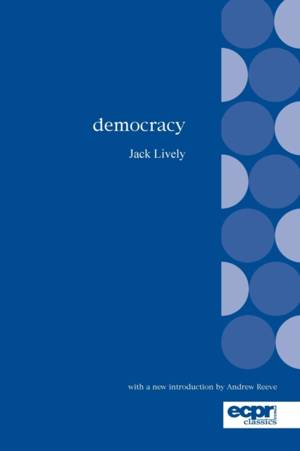
- Afhalen na 1 uur in een winkel met voorraad
- Gratis thuislevering in België vanaf € 30
- Ruim aanbod met 7 miljoen producten
- Afhalen na 1 uur in een winkel met voorraad
- Gratis thuislevering in België vanaf € 30
- Ruim aanbod met 7 miljoen producten
Zoeken
Omschrijving
Jack Lively, who died in 1998, published Democracy in 1975. It is a 'classic' because it deals with a large and highly controversial subject in a brief, clear and definite way. It exemplifies the art of producing a short book on a large subject, written with quiet authority that inspires the reader's confidence in the judgements being made. Part of this authoritativeness derives from his perspective being richly informed by historical study. The central thesis is that the meaning of democracy is political equality. Less explicitly but importantly, there are two related sub-themes: the relationship between political equality and social equality, and the need (as Lively saw it) to consider political equality as one of a number of desirable social values which might need to be weighed in the balance. This thesis, and these themes, are in one way timeless; and the book may justly be regarded as a classic exposition of the political equality characterisation of democracy. In another way, the book is a classic because it deals with a particular period in the academic debate about democracy: when the value (and even the possibility) of normative enquiry was widely doubted; when the status of 'political theory' was challenged both in the discipline of politics and by the claims of other 'modes of theorising' (Lively's term); and, above all, when the value (and even possibility) of democracy itself was strenuously contested.
Specificaties
Betrokkenen
- Auteur(s):
- Uitgeverij:
Inhoud
- Aantal bladzijden:
- 130
- Taal:
- Engels
- Reeks:
Eigenschappen
- Productcode (EAN):
- 9780955248801
- Verschijningsdatum:
- 1/06/2007
- Uitvoering:
- Paperback
- Formaat:
- Trade paperback (VS)
- Afmetingen:
- 160 mm x 234 mm
- Gewicht:
- 208 g

Alleen bij Standaard Boekhandel
+ 64 punten op je klantenkaart van Standaard Boekhandel
Beoordelingen
We publiceren alleen reviews die voldoen aan de voorwaarden voor reviews. Bekijk onze voorwaarden voor reviews.








